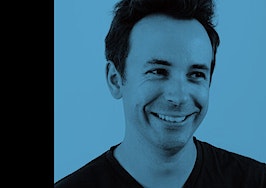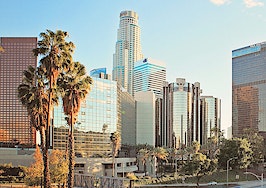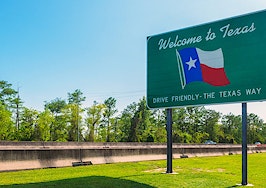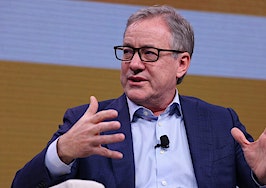The Phoenix metro area is known for a few things. It’s sunny all year long. It’s very hot in the summer. And there’s a whole lot of sprawl.
In many ways, that last feature has worked to Phoenix’s advantage. Sprawl has allowed the region to grow quickly and stay affordable, and has turned it into a testing ground for iBuyers such as Opendoor that use technology to make quick cash offers on homes that are all relatively similar.
But a new startup co-founded by one of the people behind Opendoor thinks there’s actually a better way.
San Francisco-based Culdesac launched publicly last week and aims to build the “first car-free neighborhood from scratch in the U.S.” In a blog post, Ryan Johnson — Culdesac’s co-founder and CEO, and a co-founder and former vice president at Opendoor — explained that the idea is to construct a community for 1,000 people that will have zero cars.
“Restaurants and shopping will be a short walk, rather than a strip mall miles down the road,” Johnson explained. “Front doors open into leafy shared courtyards, not rows of car tailpipes. Trips to the grocery store for ice cream means pulling out your sandals for a stroll, not pulling out of your driveway into traffic.”
The $140 million project will be located in Tempe, Arizona, which sits about 8 miles from downtown Phoenix. Construction is already underway and the project, officially dubbed “Culdesac Tempe,” is slated to open next fall.

Credit: Logan Hunt Film and Culdesac
Culdesac Tempe is an ambitious undertaking, and has already earned some praise from the urban design community. For example, Karrie Jacobs, who writes about development issues, was largely positive when speaking to Inman. She noted that the development will be located on a light-rail line and in a denser part of the metro area, and that going car-free is ultimately a good thing for communities.
“I think it’s cool that developers are thinking that way in the Phoenix area,” she said. “It suggests there are some healthy changes happening.”

Credit: Culdesac
But Culdusac did not respond to Inman’s repeated requests for more information about its business plan, target density and other issues. And so there are still many unanswered questions, including how enthusiastic consumers might be for car-free living in an area that has invested so heavily in sprawl.

Carol Royse
“It’s a hard sell,” Carol Royse, who runs a Keller Williams team in the area, told Inman.
One of the big problems with a car-free community in Tempe, Royse explained, is the weather. Temperatures soar well above 100 degrees for much of the summer, which has a tendency to drive people indoors where they can access air conditioning.
“You don’t see anybody sitting on restaurant patios in the summer,” Royse added. “You don’t see people basking on their front patios with the sun blazing down.”
Those conditions could make it difficult to lure consumers into a community where walking is necessarily a primary mode of transportation even in the hottest parts of the year. And while Johnson promised “leafy shared courtyards” in his blog post, Royse argued that Phoenix’s heat can bedevil people even when they’re in the shade.
“When it’s 115 degrees, even standing in the shade it’s still 115,” she said.

Debi Gotlieb
Debi Gotlieb, an agent with Key Results Realty, offered a similar take.
“We don’t walk far,” she told Inman about life in the Arizona capital. “We walk from a parking lot to our air conditioned car.”
However, both Gotlieb and Royse did say that Culdesac’s concept might appeal to college students. Tempe is home to Arizona State University, which has nearly 90,000 students and is one of the largest public schools of its kind in the U.S. Many of those students don’t have cars, Royse explained, and may be drawn to the prospect of a tighter urban network of housing, shops and restaurants.
Most families and working professionals, however, live in residential neighborhoods south of the university and Royse expressed skepticism that people in those demographics would be drawn to car-free living.
“No way, it isn’t going to happen,” Royse said, adding that even her elderly clients moving into senior living centers currently want at least one parking spot.
Neither Culdesac’s website nor Johnson’s blog post explicitly say who the target demographic is for the project. The company also hasn’t provided Inman with information on the breakdown of rentals verses any owner-occupied units in the development.
But reading the materials that are available, it’s easy to wonder if a community for transitory college students could fully deliver on Culdesac’s lofty vision. On its website, for example, the company expresses the desire to “remake cities all over the U.S. for people, not cars.”
And Johnson’s blog post talks of breaking the cycle of car-dependent cities with “the first post-car real estate developer in the U.S.”
Culdesac, in other words, appears to be striking at the heart of car-oriented development — arguably an admirable goal but one that will presumably necessitate winning over a broad swath of consumers.
To do that, Culdesac is merging its dense and walkable urban design — so, those shops and restaurants Johnson mentioned — with “on-demand mobility.” That means the development will have dedicated rideshare pickup zones so people can easily use Uber and Lyft. According to Johnson it will also “be a welcoming home for shared bikes and scooters, providing them with dedicated parking spaces and charging infrastructure.”

A rendering of Culdesac’s development in Tempe. Credit: Culdesac
Royse, however, wasn’t convinced those features would be enough.
“Do you want to use Uber for everything you want to do?” She asked. “No.”
Gotlieb said part of the problem is that Tempe and the surrounding region simply don’t have the connectivity of cities like Chicago, where there are enough destinations near housing that many people are able to go car-free. As a result, Culdesac residents might be able to get an ice cream cone or meal on foot, but will still likely need a vehicle to reach things like doctors or many jobs.
“I still think that you’re going to need a car,” she added. “We’re not Chicago. We’re not there yet.”
None of this is to impugn Culdesac’s stated goals, or to suggest that its idea is fatally flawed. Both Gotlieb and Royse described the project as ultimately interesting, and Jacobs said that the objectives are a step in the right direction. And while Johnson’s blog post frames Culdesac as a first-of-its-kind concept, the development is in many ways riffing on established movements such as New Urbanism, which have for years tried to wean cities off cars.
Forbes also reported that Culdesac has so far raised $10 million in venture capital, indicating that investors are willing to give the company a chance.
The question now is if Arizona residents will do the same, and sign on for what Johnson described as the “post-car future for American cities.”













